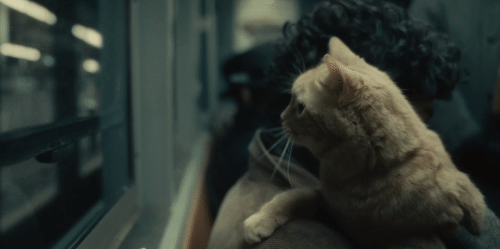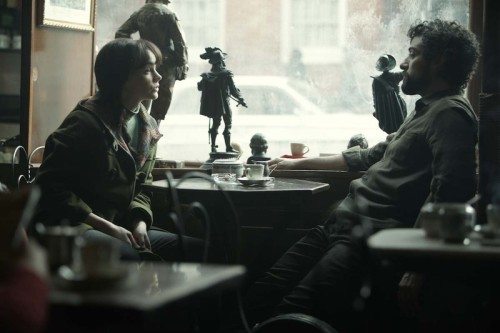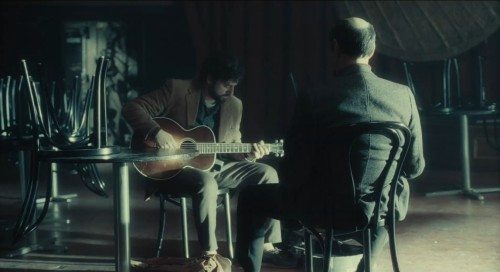A good portion of audiences and critics left the Coen Brothers’ latest, Inside Llewyn Davis, feeling cold—and not just because of the brooding cinematography and icy landscapes. Beautiful, they called it, but distant. A film that, like its main character, keeps pushing you away.
Initially, I felt this way too. The morning after, however, I began to think about wretched Llewyn Davis (Oscar Isaac). I continued to think about him and the film for days. And now weeks.
Inside Llewyn Davis is, I’ve decided, brilliant. It is one of the Coen Brother’s best works, and that’s saying a lot as my favorite film is also one of theirs. Llewyn perfectly captures the guilt of survival. It is a film about loss and dissolution and self-loathing—only it tells this story by traveling oblique avenues. It is a song of farewell. It sings to the suffering that makes you you, if you happen to be Llewyn Davis.
If you wondered what Inside Llewyn Davis was about, maybe these evolving thoughts will help yours cohere. Perhaps in agreement or just as likely not. It doesn’t matter. The point is to think, and to feel, and this film has made me do plenty of both.
Others have suggested that Inside Llewyn Davis is a retelling of the Odyssey, and they’re right to a degree, but I see that as only structure.
What I hear is all lament.
Hang Me, Oh Hang Me
Hang me, oh hang me
I’ll be dead and gone
Wouldn’t mind the hanging
But the layin’ in the grave so long, poor boy
I’ve been all around this world
When we first meet Llewyn Davis—an irascible, judgmental, arrogant folk singer of little repute—he is at the end of an arc. He sits onstage at the Gaslight and releases himself into a song. ‘Hang Me, Oh Hang Me’ is about the earthbound eternity that lies ahead. It is not, the song suggests, the pain of transition we should fear; it is the endless time locked in the grave that will follow.
Llewyn walks outside and is beaten by a man for reasons yet to be explained. He is kicked when he is down. And then, going back in time about a week, the story starts.
This is the film’s beginning and ending because it is the completion of this contained story. What happens before and after are other stories. Inside Llewyn Davis is about how and why its main character seeks and receives his beating.
Fare Thee Well
One of these days and it won’t be long
Call my name and I’ll be gone
Fare thee well, my honey, fare thee well
Llewyn sleeps on whomever’s couch he can score. His solo record doesn’t sell. Earlier, during events that preceded the film, his partner Mike killed himself. Whether that event soured Llewyn or only exaggerated his innate bastardy, only the Coens can say for sure. Regardless, Llewyn is a bastard. He makes being a son-of-a-bitch a point of pride. He insults those who do him favors. He pushes everyone away, even those he loves. He disparages those who care for him.
But these people—the Gorfeins, Jim, Jean, his sister—continue to care for Llewyn. They seem not to—particularly Jean (Carey Mulligan)—but their reactions to him are strong. They do not show uncaring disavowal; they exhibit anger at his betrayal. Jean tells Llewyn that she’s pregnant and the baby is probably his. She curses him, denigrates him. She wants him to see how rotten he is and he, while expressing that very rottenness, keeps goading her on. He does so intentionally—perhaps subconsciously, but still. He baits her, and pretty much everyone else he speaks to throughout the film. Daring them to hit him. To get under his skin.
One wonders why Jean slept with Llewyn to begin with if he was such a louse. While the film implies in other moments that Jean does not particularly value chastity, her sexual liberty is not enough to explain this decision away.
At some time not long past, and for some reason never mentioned, Jean literally had affection for Llewyn. There was something attractive about him, something to which he needs to return—even if it crushes him to admit that he needs any human connection.
I’ve been somewhat obsessively listening to the soundtrack to the film, which T. Bone Burnett produced. ‘Fare Thee Well (Dink’s Song)’ appears on it twice. At the Gorfein’s, after losing and finding the cat, he is coerced into playing this song at a dinner party.
When Lillian Gorfein joins in, singing Mike’s part, Llewyn reacts emotionally for the first time in the film. He lets his facade of cool drop completely to erupt in pain and anger.
Mike is dead. How dare you make me remember? How dare you try to take his place?
Five Hundred Miles
If you missed the train I’m on
You will know that I am gone
You can hear the whistle blow a hundred miles
There is a cat.
The Gorfein’s cat, Ulysses, slips out the door in Llewyn’s wake. He chases it, catches it, lets it escape again. He finds the wrong cat and returns it, then must leave with it again. This cat—rejected—comes with him on his journey, is abandoned, struck by his car, and slinks off into the night, injured.
Later, Llewyn sees a poster for the Disney film, The Incredible Journey, about pets that find their way home across long distances. Ulysses does this same thing, reappearing at the Gorfein’s apartment near the end of the film despite Llewyn’s inability to either really keep or really lose the cat.
No matter what Llewyn does—try, not try—the cat returns. This is a major part of the film, which, as I’ve said, is about saying goodbye and feeling the suffering of goodbye. Like the cat, no matter what Llewyn does—try, not try—he has no choice but to return to face that pain.
Inside Llewyn Davis covers this segment of Llewyn’s journey—his ‘Odyssey’ back home, if you will. He was once in the merchant marines. He once had a partner in music. Once, at least, Jean loved him, as did other women. One of them has his child, a child he didn’t even know existed. Now Llewyn’s just a louse, attempting to be a folk singer, but more actively concerned with pushing everyone away.
My thesis is that Llewyn spends the film both running from and towards anguish. For Llewyn, that pain is part of home. Pain is what gives him talent and what crushes that talent. The death of his partner Mike has opened a door, out of which he’s slipped. He spends the length of the film wandering, unable or unwilling to let the pain of loss in, but knowing he must. He must find his way home.
What Llewyn does throughout Inside Llewyn Davis is push people and the potential for emotional connection away, harder and harder, until finally one of them forces him to feel the suffering he’s both escaping and craving.
Llewyn is terrified of feeling the brunt of Mike’s death. He is afraid it will destroy him, but avoiding it destroys him just as quickly. He must go home. He knows the return will bloody him, but he has no choice.
It isn’t the hanging that he fears, it’s the long lament afterwards.
Please Mr. Kennedy
P-P-Please Mr. Kennedy (Uh oh!)
I don’t wanna go (please don’t shoot me into outer space)
I realize, of course, that I’m extrapolating from what little the film offers in way of detail to build a world of meaning. I also realize that I’m doing so having only seen the film once—an oversight I intend to correct. But if you listen to the music of the film, these songs that I’m using as section headers, you’ll find the theme there. Folk music isn’t all about loss and farewell but these songs are.
Llewyn records the gag song, ‘Please Mr. Kennedy’, disparaging it even as it pays for his liaison with Jean—the song’s author’s partner. Llewyn signs away his rights in exchange for $200 cash to pay for an abortion.
Which money, it turns out, he doesn’t need. The last abortion he paid for didn’t take place—his lover kept the child and never told him. Llewyn has a family he does not know. We see him on the road, passing the town in which his child lives. He considers taking the turn off, but doesn’t. What waits for him down that road? Only opportunity to face the past.
It is at this point that he strikes the cat with his car. Wounded and lost, it chooses to continue on on its own. It does not accept any care. It is an animal that needs to hurt and heal on its own. When it is ready, it will find its way home.
Just like Llewyn.
Green, Green Rocky Road
See that crow up in the sky?
He don’t walk, but he just fly.
He don’t walk, but he don’t run.
Keep on flapping to the sun.
‘Green, Green Rocky Road’ is a song by Dave Van Ronk, the folk singer who serves as loose inspiration for Llewyn Davis. His version of this song plays over the credits, but the lyrics in Van Ronk’s take differ from the ones Oscar Isaac sings as Llewyn. They go like this:
See that crow up in the sky
He don’t crow, nor can he fly
He can’t walk, nor can he run
He’s black paint slattered on the sun.
The Coens have retooled the song. Now, instead of being about the image of something immovable, it’s about running away.
I find that I’m writing in circles. Perhaps you’ve noticed? There’s this idea that just spins around my head when I think about this film. Like a conspiracy theorist, I find evidence to support it wherever I look.
The idea is that Llewyn Davis needs to let the pain of his partner’s suicide in, but he’s afraid to face it. So he spends the course of the film trying to trick someone into forcing him to feel it. In the beginning—which is the end—he succeeds. He is finally mean enough to someone innocent enough that he is taken out back and beaten.
In the run up to this, he does everything he can think of to escape facing this pain, afraid as he is of what comes after that metaphorical hanging.
The Death of Queen Jane
What’s he gonna play for his important audition for this music manager? Those songs are every bit as character-defining as much as the dialogue is, and we didn’t know what the song in that scene would be.
There was fiddling and dancing on the day the babe was born
But poor Queen Jane beloved, she lay as cold as a stone
Of all the songs one could pick to score a record deal with the fabled manager Bud Grossman, ‘The Death of Queen Jane’ would probably be the last you’d opt to play.
Outside of the line of dialogue being stunningly perfect, is there anything surprising about the fact that Grossman hears it and responds, “I don’t see a lot of money here”?
Llewyn’s reaction to this torpedo is, “Okay. Okay, that’s it?”
I suggest that what he wanted to hear was not some sort of constructive criticism that could re-spark his flagging motivation, but instead some fatally crushing blow that would free him from his endless journey and force him home.
Grossman only continues to suggest that Llewyn get back together with his partner. Llewyn admits that’s good advice.
Mike, of course, is dead.
The Shoals of Herring
Night and day the seas were barren
Come wind, oh come wind again
Sweating or cold, growing hot, growing old — oh dying!
As we hunt the bonny shoals of herring
And then his own father, hearing Llewyn’s music, craps his pants. Llewyn was playing a song about seeking elusive riches.
Llewyn tries to skirt the noose one last time by rejoining the merchant marines, but he told his sister to throw out all his stuff, and that included his union card. He rejected his past; he rejected her and his family. Broke and hopeless, he has no choice but to return to the Gaslight and face the music.
Seeing Jean, he does something unexpected. In his deep, wounded exhaustion, he, for the third time in the film, shows emotion. He tells Jean that he loves her. Llewyn’s ability to skirt the world is worn through. Having tried every couch he can, he’s out of options. He has no choice but to go home.
The second time Llewyn showed emotion, in case you forgot, was in the car with Roland Turner (John Goodman), the sanctimonious jazzman. Roland pushed Llewyn too hard about Mike and Llewyn offered to shove Roland’s cane up his ass.
Farewell
So it’s fare thee well my own true love,
We’ll meet another day, another time.
It ain’t the leavin’
That’s a-grievin’ me
But my darling who’s bound to stay behind.
Full circle, back to the Gaslight, except now we know why Llewyn has been struck down. It is because he harassed the poor woman who sang the night before, heckling her to show her panties—a move repugnant even for Llewyn.
As he finishes playing ‘Fare Thee Well’, Bob Dylan takes the stage to perform his own music. In this case, the song is ‘Farewell’. It is a song that mirrors the one that Llewyn and Mike had sung together and which now Llewyn plays alone. As Llewyn is able to confront the death of his partner, his suffering shifts. Dylan already is there to succeed him.
Llewyn goes out back. He has pushed hard enough. The world finally pays him back in kind. He feels the pain he has been swallowing, both emotionally and physically. Mike is gone. That is real; no amount of attitude can keep it from Llewyn any longer.
Will accepting it change him? It doesn’t matter. This story is concluded. All that’s left is the lyin’ in the grave so long, poor boy.
I’ve been all around this world.






Great post. I watched this at home on a dvd screener, and I really want to go and experience it in a theater, in the dark, in real time. This film really digs into you.
Thanks. I’ve been trying to find a moment to see it again, but so far no luck. Why don’t you bring that screener to Hawaii…
I just discovered this movie and your article. Thank you. I instantly fell in love with this movie and you really helped me articulate why. Also, may I add something to the discourse? The final word of the film is Llewyn saying “au revoir.” Which I find just perfect.
Glad you liked it, Joe. Time to rewatch this film.
This is all right on. It is a circular lament. Davis is bringing it all upon himself. But the other imporant aspect, I think, is that in this movie it is specifically the lament of the artist.
Davis has a need to create, and to create in the way he needs to do it. Nothing stops him. The suicide of his partner, his failed record, his penniless existence, the hatred of those who once supported him. He can’t stop being the artist he is, even though he’s destroying himself being that person.
He wants to make a living doing this, even though he sees the sort of people who are successful. They aren’t who he wants to be. Then he meets John Goodman, and essentially sees his own future: a failed musician, fat and crippled, an asshole and a heroin addict. And STILL he keeps on doing what’s he doing.
He drives past his old girlfriend and their child, even though, who knows, he could pursue a different life with them, at least be a part of his kid’s life, but he doesn’t. He just goes back to doing the same thing.
When Dylan plays at the end, it’s not that he’s better than Davis, he’s just the guy who people respond to. That too is part of being an artist. You can’t control what people want to hear, even if you’re playing your soul out.
Davis is stuck in a loop of his own making, because he has to do what he has to do, even if it kills him.
With this and Barton Fink, I think the Coens have gotten inside what it means to create, and what it does to you, better than just about anyone.
Yes. I second the motion from the floor.
I really have to go out and see this a second time.
Amen
i agree with everything you said except for the misplaced apostrophe in the third paragraph.
that being said, i still liked gravity more and i already went out and saw that again.
There is no accounting for taste or apostrophes.
But I’m glad you agree, e. My heart cockles are warm.
great read, really looking forward to watching this. Hopefully this week.
thanks mash. hope you like it as much as i did.
finally watched it. absolutely loved it. I can’t quite think of a word for it but the Coen brothers films all share this quality of .. well quality, a sort of effortless sublimeness in terms of how everything just flows.
I just went through their filmography. I’ve watched every film they’ve made except for Fargo and Blood Simple. Will need to get on to those now.
I think the first one I watched was The Hudsucker Proxy when I was a teenager and it was on TV. It had this wacky quality I loved at the time.
Glad you liked it as much as I did. Can’t say I agree about all their films, tho. Some are just… weird without purpose. Never much cared for Lebowski or Burn After Reading and True Grit? It’s an odd film to remake and the cheesy original is better.
You’ll like Blood Simple and Fargo, though. Just had Blood Simple in a double feature with Down Terrace if you want to check the archives. Here’s the link: https://www.standbyformindcontrol.com/2013/09/mcdf62-bloodsimple-downterrace/
yeah I thought about this more and I think what I was trying to describe is how in their films there is a completeness and uniqueness to each world they create. Even in their more minor films the tone and characters always seem in sync even if the story is a bit slight or the film doesn’t quite work.
There’s nothing ever generic about their films.
They do have style. And intention. And that makes even their not-quite-excellent films interesting. I feel the same way about Soderbergh and that’s why I’ve seen everything those directors have made.
But Blood Simple is great. It’s nice to see their style emerge. Miller’s Crossing is my favorite (of theirs, and in general my favorite film). I should watch Hudsucker again.
Watched Blood Simple on Saturday night. I liked it a lot, it felt slow in parts but I think that’s because of the editing.
I am watching this wonderful film right now and I am loving every moment of it. This is what I am looking for in cinema: the pace lingers long enough for the observer to relate and empathize with characters and the story. A world populated with non-standardized individuals, each with their own agenda in a world that doesn’t care – well it never does. We just have to keep shuffling along … Great great film. Thanks so much for the review and recommendation.
We aim to please. And specifically to please you, unholy Trinity.